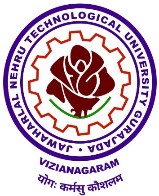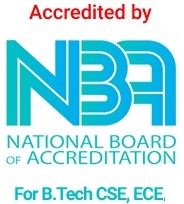Internal Quality Assurance Cell (IQAC)
About IQACELL
The IQAC is meant for planning, guiding and monitoring Quality Assurance (QA) and Quality Enhancement (QE) activities of the University. The IQAC may channelize and systematize the efforts and measures of an institution towards academic excellence. It should not be yet another hierarchical structure or record-keeping exercise in the University; it would be a facilitative and participative organ of the University. The IQAC should become a driving force for ushering in quality by working out intervention strategies to remove deficiencies and enhance quality.
Internal Quality Assurance Cell (IQAC) to periodically assess and suggest measures to upgrade the quality in the overall performance of an academic institution. With this objective in mind JNTUK- University College of Engineering, Vizianagaram has formed an IQAC cell to ensure continuous quality enhancement and sustenance in its academic as well administrative activities. As quality improvement is a continuous process the IQAC has been playing a vital role in the post-accreditation phase of JNTUK- University College of Engineering, Vizianagaram as it is committed to achieve academic excellence.
JNTUK- University College of Engineering, Vizianagaram has established the Internal Quality Assurance Cell (IQAC) as a post accreditation quality sustenance measure. The Cell comprises of different committees to assess, monitor, and advise on different quality aspects of the overall functioning of the University.
VISION
"To create the bench mark in defining the quality of JNTUK-UCEV as a professional higher education in Engineering and Technology in quality evaluation in teaching, learning, research & development, a quality culture with conscious, reliable and transparent efforts through a combination of self and external quality evaluation, promotion and sustenance of the institutional and human values to meet global standards "
MISSION
- To channelize and systematize the efforts and measures towards academic excellence in order to enhance quality.
- To encourage departments to establish student Learning-centric environment to use ICT tools for teaching and learning process and to inculcate value–based education system.
- To encourage Departments to organize Seminars, Workshops, Orientation and Faculty Development Program.
- To ensure an effective and transparent operations to achieve excellence in Academic, Administrative and Financial activities.
- To develop an Institutional MIS this will provide the quality information about the institution.
- To ensure the adequacy, timely maintenance and smooth functioning of the support structure.
- To build association with stakeholders and to stimulate Social Responsibility.
Strategies & Objectives
• Development and application of quality benchmarks/parameters academic and administrative activities of the University;
• Facilitating the creation of a learner-centric environment conducive for quality education and faculty maturation to adopt the required knowledge and technology for participatory teaching and learning process;
• Arrangement for feedback responses from students, parents and other stakeholders on quality related institutional processes;
• Dissemination of information on the various quality parameters of higher education;
• Organization of inter and intra University workshops, seminars on quality related themes and promotion of quality circles;
• Documentation of the various events /activities of the University, leading to quality improvement;
• Acting as a nodal agency of the University for coordinating quality-related activities, including adoption and dissemination of good practices;
• Development and maintenance of Institutional database through MIS for the purpose of maintaining /enhancing the institutional quality;
• To develop a system for conscious, consistent and catalytic action to improve the academic and administrative performance of the institution.
• To promote measures for institutional functioning towards quality enhancement through internalization of quality culture and institutionalization of best practices.
• To ensure an enhancement and integration among the various activities of the university and institutionalize many good practices;
Functions
- Developing ethical work culture in JNTUK-UCEV.
- Establish and implement quality benchmarks for academic and administrative activities.
- Plays a vital role in the Institute for coordinating various activities ensuring quality including adoption and dissemination of best methods and practices.
- Organizing inter and intra Institutional Workshops, Seminars, awareness programs, Project Exhibition and Research activities.
- Ensuring a learner-centric ambience conducive for quality education and for continual improvement.
- Emphasize faculty expertise to adopt the knowledge, technology and innovations for participatory teaching and learning process.
- Conduct periodic audits of academic, administrative and research activities for quality assessment.
- Collection of feedback from different stakeholders, Analyze and suggest remedial actions for all stakeholder satisfaction.
- Preparing Annual Quality Assurance Report (AQAR) as per norms.
Act as a dynamic system for quality changes in the college
Benefits
The IQAC must create its exclusive window on University website, to regularly report on its 5 activities, as well as for hosting the AQAR. Benefits of IQAC
- Ensure heightened level of clarity and focus in institutional functioning towards quality enhancement.
- Ensure internationalization of the quality culture.
- Ensure heightened level of clarity and focus in institutional functioning towards quality enhancement b) Ensure internalization of the quality culture;
- Ensure enhancement and integration among the various activities of the institution and institutionalize good practices;
- Provide a sound basis for decision-making to improve institutional functioning;
- Act as a dynamic system for quality changes in the University;
- Build an organized methodology of documentation and internal communication.
Role of coordinator
The coordinator of the IQAC Prof.G.Jaya Suma is a senior academic /administrator entrusted knowledge about the collage, and its various functions, usage for effective communication. Coordinator of the IQAC is ensuring the effective functioning of the collage.
Operational Features of the IQAC
Quality assurance is a by-product of ongoing efforts to define the objectives of an institution, to have a work plan to achieve them and to specify the checks and balances to evaluate the degree to which each of the tasks is fulfilled.
To promote measures for institutional functioning towards quality enhancement through
- Development and application of quality benchmarks/parameters f o r the various academic and administrative activities of the University;
- Facilitating the creation of a learner-centric environment conducive for quality education and faculty maturation to adopt the required knowledge and technology for participatory teaching and learning process;
- Arrangement for feedback responses from students, parents and other stakeholders on quality related institutional processes;
- Dissemination of information on the various quality parameters of higher education;
- Organization of inter and intra University workshops, seminars on quality related themes and promotion of quality circles;
- Documentation of the various events /activities of the University, leading to quality improvement;
- Acting as a nodal agency of the University for coordinating quality-related activities, including adoption and dissemination of good practices;
- Development and maintenance of Institutional database through MIS for the purpose of maintaining /enhancing the institutional quality;
- Development of Quality Culture in University;
Monitoring Mechanism
IQAC need to submit yearly the Annual Quality Assurance Report (AQAR) to NAAC. During the institutional visit the NAAC peer teams will interact with the IQACs to know the progress, functioning as well quality sustenance initiatives undertaken by them.
- Preparation of the Annual Quality Assurance Report (AQAR) of the University based on the quality parameters/assessment criteria developed by the relevant quality assurance body (like NAAC, NBA, AB) in the prescribed format;
- Bi-annual development of Quality Radars (QRs) and Ranking of Integral Units of HEIs based on the AQAR;
- Interaction with SQACs in the pre and post accreditation quality assessment, sustenance and enhancement endeavors. Follow up
- The AQAR shall be approved by the statutory bodies of the University (such as Syndicate, Governing Council/Board) for the follow up action for necessary quality enhancement measures.
- The Universities shall regularly submit the AQARs to the NAAC/other accreditation bodies.
All Universities shall submit AQARs and/or Quality Radars (QRs) and follow up reports of AQARs to the UGC.
S.No |
Name of the Member |
Designation |
Role in IQAC |
1 |
Prof. K. Srikumar |
Principal, JNTU-GV |
Chairperson |
2 |
Dr. P. Sree Devi |
IQAC Coordinator& Asst. Prof. of Commerce, BS&HSS Dept |
Member Secretary |
3 |
Prof. G. Jaya Suma |
Registrar, JNTU-GV |
Member (university nominee) |
4 |
Dr. Bijay Kumar Sahu |
Head of IFPC, NRDC, Govt of India |
Member |
5 |
Abraham varghees |
NSTL, Scientist (F) |
Member |
6 |
Dr. K. Babulu |
Professor of ECE, Director of R&D, Admissions |
Member |
7 |
Dr. K. Chandra Bhushana Rao |
Professor of ECE, Director DAP |
Member |
8 |
Dr. P. Aruna Kumari |
Assistant Professor & Head of CSE |
Member |
9 |
Dr. K. Srinivasa Prasad |
Assistant Professor of ME Dept. & I/c Head of CE |
Member |
10 |
Dr. M. Hema |
Assistant Professor of ECE & OIE |
Member |
11 |
Dr. G. J. Naga Raju |
Associate Professor of Physics & Head of BS&HSS |
Member |
12 |
Smt. B. Prabha |
Senior Assistant |
Member |
13 |
Mr. Dandu Sai Ram (Roll No:13VV1A0422) |
Alumni |
Member |
14 |
Mr. A. Siva Krishna (Roll No:21VV1A0305) |
Student |
Member |
OUTCOMES OF IQAC
- Accredited by AICTE, New Delhi
- Improved student intake and admission
- Enhancement in faculty qualification & knowledge up gradation towards recent technology
- Improvement in academic results and placement
- Improvement in research facilities and projects
- Improvement in entrepreneurship development
- More linkages with industries
- Improved participation of students in various national and international level competitions like Smart India Hackathon, Code Vita, Tata Crucible Campus Hackathon, etc…..
- Involvement in reducing curricular gap and thus upgrading of UG, PG regulations
- Improved infrastructure facilities
- Improvement in number of titles and volumes in the library
- Improvement in research, extension & consultancy activities
Annual Quality Assurance Report (AQAR)
AQAR Year |
Download |
|---|---|
Report 2019-20 |
|
Report 2018-19 |
|
Report 2017-18 |
Academic Audit Report
Academic Audit Report Year |
Download |
|---|---|
Report 2023-24 |
|
Report 2022-23 |
|
Report 2021-22 |
|
Report 2020-21 |
|
Report 2019-20 |
|
Report 2018-19 |
|
Report 2017-18 |
JNTUK University College of Engineering Vizianagaram (JNTUK-UCEV) and Natsoft Corporation are collaborated to set up a Blockchain Center of Excellence (BCoE) to develop skills, create and deliver innovative solutions related to blockchain and its associated digital technologies.
The MOU partnership intends to set up a for carrying out any innovation or development of blockchain and its associated technology solutions for the government and private enterprises.
NATSOFT CORPORATION and JNTUK-UCEV (Vizianagaram Campus) will work together in Blockchain and associated emerging technologies to augment the skills and capabilities of the associated faculty members, researchers and students through appropriate learning programs and involvement in projects.
BCoE would encourage interactions with the industry and government agencies on key issues faced and to design suitable innovate solutions to address them through Blockchain and associate technologies.
The Center will also explore opportunities to offer internships to relevant qualified UCEV students on various blockchain solutions and projects.
S.NO |
Name of the Workshop/FDP |
Date |
1 |
5 Day FDP on “MOODLE Learning Management System” |
22-07-2020 to 26-07-2020 |
2 |
A 15 day online FDP on “Data Science and it's Applications in STEM “ |
07-09-2020 to 21-09-2020 |
3 |
Workshop on “Systems office Administration and Fundamentals” |
16-09-2020 to 30-09-2020(3PM to 5 PM) |


